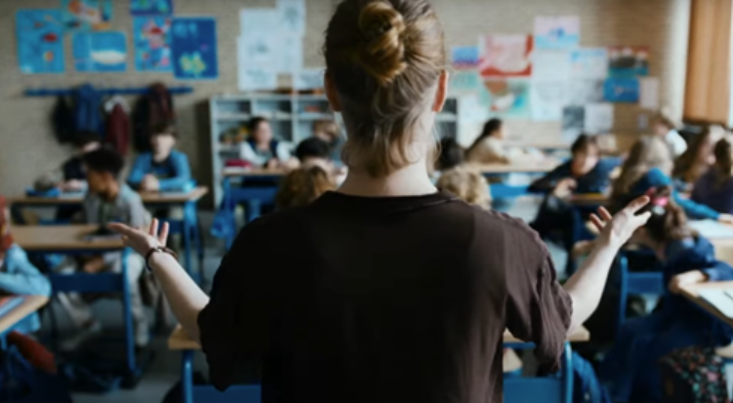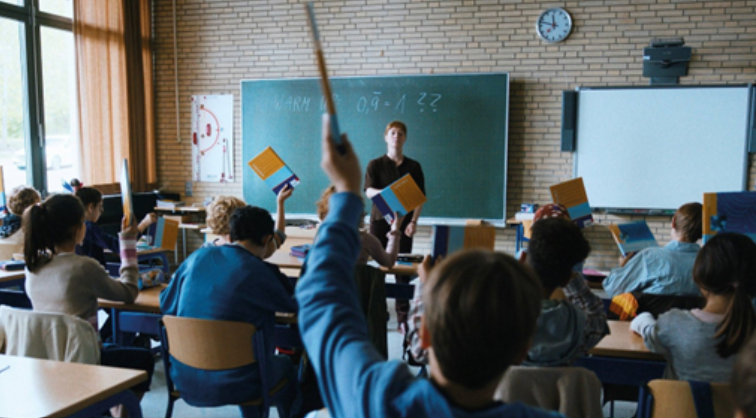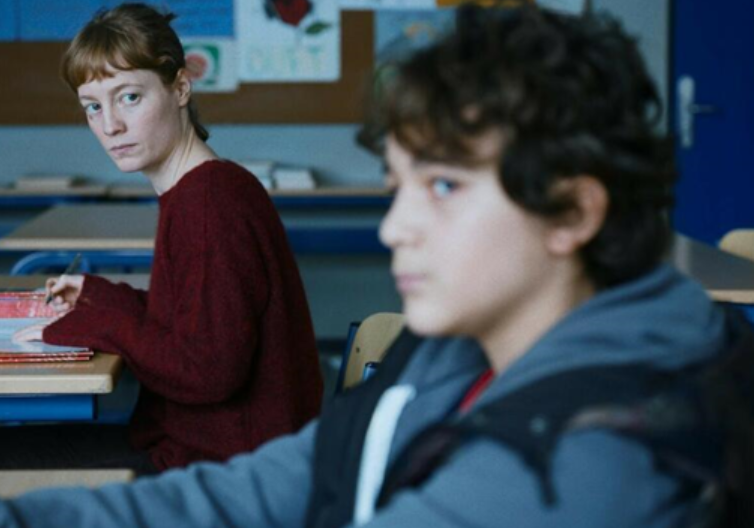
Reviewed by Kennice Foo
“What happens in the teachers’ lounge, stays in the teachers’ lounge”, Carla Novak asserted during an interview with her students, even as she’s embroiled in the eye of a storm that began from there. As the film plays out, the responses to that assertion would be: if only, unfortunately not, I’ll be damned.
This is just one of the many ironies that shroud Novak in the German drama film The Teacher’s Lounge, so much so that it approaches absurdity. The young, idealistic but naive schoolteacher (portrayed marvellously by Leonie Benesch) takes matters into her own hands when theft in the school becomes more prevalent. Caught between her ideals and reality, the consequences of her actions threaten to break her.
Watching this film is like playing Jenga but without the fun and games. It is so taut the first time I watched it I was borderline nauseous; but also because of my personal experiences with teaching and what a nightmare this would be. Right off the bat, the film opens with a string-plucking soundscape as the viewer is plunged into the centre of the theft issue, a sense of mistrust brooding. The film does not let up at all, and the squarish 4:3 aspect ratio adds to the sense of tightness and claustrophobia.
The film is not an easy one to sit through, but its effective commentary on the current state of society is worth it. It is drama at its finest, a near-perfect miniaturisation of current society on school grounds.

Schools are institutions with a foundation built on trust — and yet trust is so fragile. The Teacher’s Lounge shows how mistrust slips in as easily as the wind in its modern-day study of trust versus truth, powered by technology that exacerbates the proliferation of mistruth. It is rare to see a film like this that holds a mirror to the post-truth society, and does it so well.
Philosopher Friedrich Nietzsche posited: “All things are subject to interpretation. Whichever interpretation prevails at a given time is a function of power and not truth.” The film advances this argument as its focus goes from finding the thief to the power struggle between the accused and the accuser, a matter of who can garner more support. Traditional power dynamics are inverted.
Ironically, what Novak teaches in the classroom is a different story. The notion that modern science serves as a beacon of logic and predictability is challenged within the narrative’s framework. Maths and science lessons with topics like astronomy taught in classrooms seem incongruent with the unpredictable nature of reality portrayed. This dissonance raises profound questions about the role of morals and integrity in fostering a flourishing society, hinting at the necessity of societal contracts to navigate the murky waters of power dynamics. Lessons in the classroom are merely child’s play, and teachers haven’t caught on yet.
In dealing with Oskar Kuhn (Leonard Stettnisch), a bright but troubled student whose mother becomes Novak’s archnemesis, she pulls out her Rubik’s cube to entice and engage the unresponsive kid. The scene encapsulates the irony that envelops Novak. Here she stands, a teacher of maths and science, realms defined by clear steps, logic, and predictability. She tells Oskar that to solve it, “a clear sequence of actions” is needed. Yet, she finds herself in a broader situation lacking any semblance of order or rationality. Solutions are elusive even in domains built on the premise of their existence.
What she throws into the mix is her naivety, rashness, unwiseness and self-righteousness, the latter often the subject of scorn from her exasperated colleagues. In a moment of impulse and folly, she makes a secret video recording in the teacher’s lounge, thinking that she could catch the thief but forgetting the legal consequences of it. This mistake (and the others that follow) causes seismic shifts, like a thread that unravels and spins completely out of control. To what extent will she pursue her path, which ensues dragging everyone down?

In her pursuit of the ‘truth’, she fails to see that beyond mere truth lies a power struggle, where the ability to assert dominance and rally support holds sway. And this is why this film is so magnificently gut-wrenching — the ones whom she goes to great lengths to care for and protect turn against her at the drop of a hat.
This post-truth era thrives on social divisions that threaten the very fabric of social stability. Stubbornness, as shown in Oskar, becomes a formidable force, rooted in an unwillingness to yield, even amidst the chaos of character assassination and manipulation that pervades interpersonal dynamics.
“Truth” becomes a mere façade, wielded as a tool for manipulation rather than a guiding principle. The Oscar-nominated film furthered its stroke of genius by critiquing sensationalism in the media.
In a scene where the student journalism club interviews Novak, the kids gather round like vultures, looking on. Unbeknownst to Novak, she is dead meat. Of course, the students twisted her words to write about the worsening situation and the bubbling mistrust and instability in the school. Of course, they honed in on the opportunity to profit from it. Of course, they published the tabloid story, front page, without her prior consent. A furious Novak storms into the club room only to be shot down by the students that “We do not allow ourselves to be censored to make you look better”, refusing to admit they had twisted and taken things out of context.
The motto plastered on the wall of the journalism clubroom, “Truth overcomes all borders,” serves not as a beacon of journalistic integrity, but as a shield for cunning and scheming. It underscores the pervasiveness of media’s deception and the precarious nature of truth in a world driven by ulterior motives.
This is juxtaposed with Novak’s attempts to soften her words for students and their parents. She displays an admirable level of care and sensitivity, meticulously choosing her phrasing and ensuring the edges are rounded. However, the irony lies in how effortlessly the students twist and manipulate her words, demonstrating a flippant disregard for her efforts. It begs the question: for whose sake was this softening done, and to what end? This points to the current state of the weaponising of language that hurls the practice of softening language for the sake of the kids completely out the window. Alas, interpretation, not truth.

Ultimately, Novak is a textbook example of right intentions, wrong execution. As director Ilker Çatak quotes, “The road to hell is paved with good intentions”. Frustration — by both her colleagues and us viewers alike — arises: is she deeply resolute or unbelievably stubborn in her ways? When will she learn in this losing game?
The Teacher’s Lounge stands out as a compelling commentary on the absurdities of a post-truth society, fuelled by mass media sensationalism. It is a rarity to find films that confront these themes head-on, making it a must-watch for audiences seeking thought-provoking narratives. The film’s pacing is commendable, with Çatak skillfully crafting a plot that keeps viewers engaged from start to finish, featuring stellar performances from the cast as well.
The Teacher’s Lounge is a perfect analogy for present-day society that ends in a glorious, risible high, a story that goes way beyond just one school’s teacher’s lounge.
Click Here For More Film Reviews
Do you love writing? Send us a film review and we will feature it on our website. Any film that people can see in the theater or online. Email to: media@scape.sg
This review is also published on Singapore Film Society as part of *SCAPE’s Film Critics Lab: A Writing Mentorship Programme.

